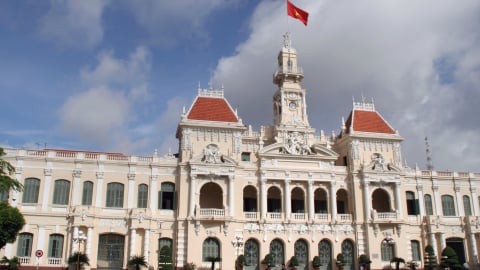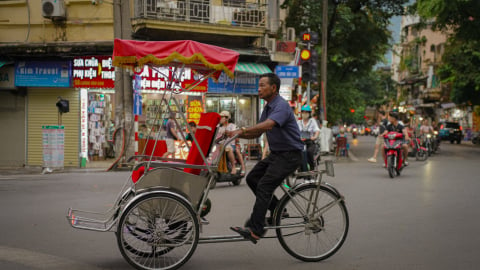A precious collection of photographs from the early 20th century is making a comeback on social media platforms, offering a nostalgic glimpse into the Mid-Autumn Festival in Hanoi. These colorful, authentic, and vibrant images, taken by French photographer Léon Busy more than a century ago, capture the bustling, dazzling, and distinctly Hanoi Old Quarter during the full moon of the eighth lunar month. These are not just photographs, but a historical story told through light and color.
A journey back in time to old Hanoi.
Between 1914 and 1917, as part of a project called "The Planetary Archive" initiated by the French philanthropist Albert Kahn, photographer Léon Busy was sent to Vietnam to document daily life in the North. Besides historical photographs of old streets like Hang Luoc and famous landmarks like Tran Quoc Pagoda, he made a remarkable "discovery" on the Mid-Autumn Festival in 1915 on Hang Gai Street. The atmosphere was already festive, with stalls selling lanterns and traditional toys lined up one after another, and people sitting on their porches diligently whittling bamboo to make lanterns.

Léon Busy's photographs depict a vibrant Mid-Autumn Festival scene, which, according to cultural writer Hoàng Đạo Thúy in his book "Old Hanoi Streets," became bustling from the first day of the eighth lunar month. "All the mothers and children of Hanoi flocked to Hàng Gai Street. All the shops on the street transformed into stalls selling paper Mid-Autumn Festival toys," he wrote. Paper elephants, paper horses, rabbit lanterns, dragon-shaped fish, lion heads, and revolving lanterns... were handcrafted and neatly displayed in front of the houses.


Léon Busy's photographs of the Mid-Autumn Festival in Hanoi are part of a collection of 1,382 photographs of Vietnam, currently on display at the Albert Kahn Museum in Paris, France. What makes these photographs special is that they were taken using Autochrome color photography, a technology considered extremely luxurious in Vietnam at the time, offering the most authentic and vivid glimpse into Hanoi over 100 years ago.

The unique features of traditional Mid-Autumn Festival toys.
Léon Busy's photo series highlighted familiar Mid-Autumn Festival toys for children of that era. Most characteristic were the cellophane paper lanterns, especially the carp and star-shaped lanterns. The carp lantern, depicting the carp leaping over the Dragon Gate and transforming into a dragon in legend, became a symbol of perseverance and effort in achieving success.



In 1915, cellophane paper lanterns were considered precious toys, found only in large cities because the cellophane paper was mainly imported from France or Hong Kong (China), not as common as traditional Vietnamese dó paper or other types of paper. Unlike traditional paper lanterns, cellophane paper lanterns, when lit with a candle, allowed light to pass through, creating a more shimmering and radiant effect. Around the 1910s and 1920s, this type of lantern gradually appeared and became more popular in the 1930s.

Besides lanterns, the shops also sold masks, parasols, paper horses, puppets, and even brightly painted iron and tin statues of people riding horses. Among them, there was a rare shop on Hang Gai Street that sold folding lanterns, a type of lantern that could be folded and unfolded into a cylinder, usually made from printed colored paper or oilcloth. Although more expensive, folding lanterns were still a favorite among children at that time.


Léon Busy's collection of photographs of the Mid-Autumn Festival in Hanoi from over 100 years ago is not only valuable documentation but also showcases the photographer's talent in choosing composition, angles, colors, and subjects. He subtly and emotionally captured a bygone era, where life unfolded slowly, and traditional cultural aspects were preserved in the most authentic way.

In the modern Mid-Autumn Festival era, with its abundance of electronic lanterns and imported toys, images of the traditional moon festival still evoke deep nostalgia. They remind us of a generation that grew up with handcrafted toys, of evenings spent gathering under the moonlight, and of a simple, traditional way of life. These photographs not only revive a glorious past but also represent a cultural heritage, helping future generations understand traditional values, and thus cherish and preserve them.

 VI
VI EN
EN


































